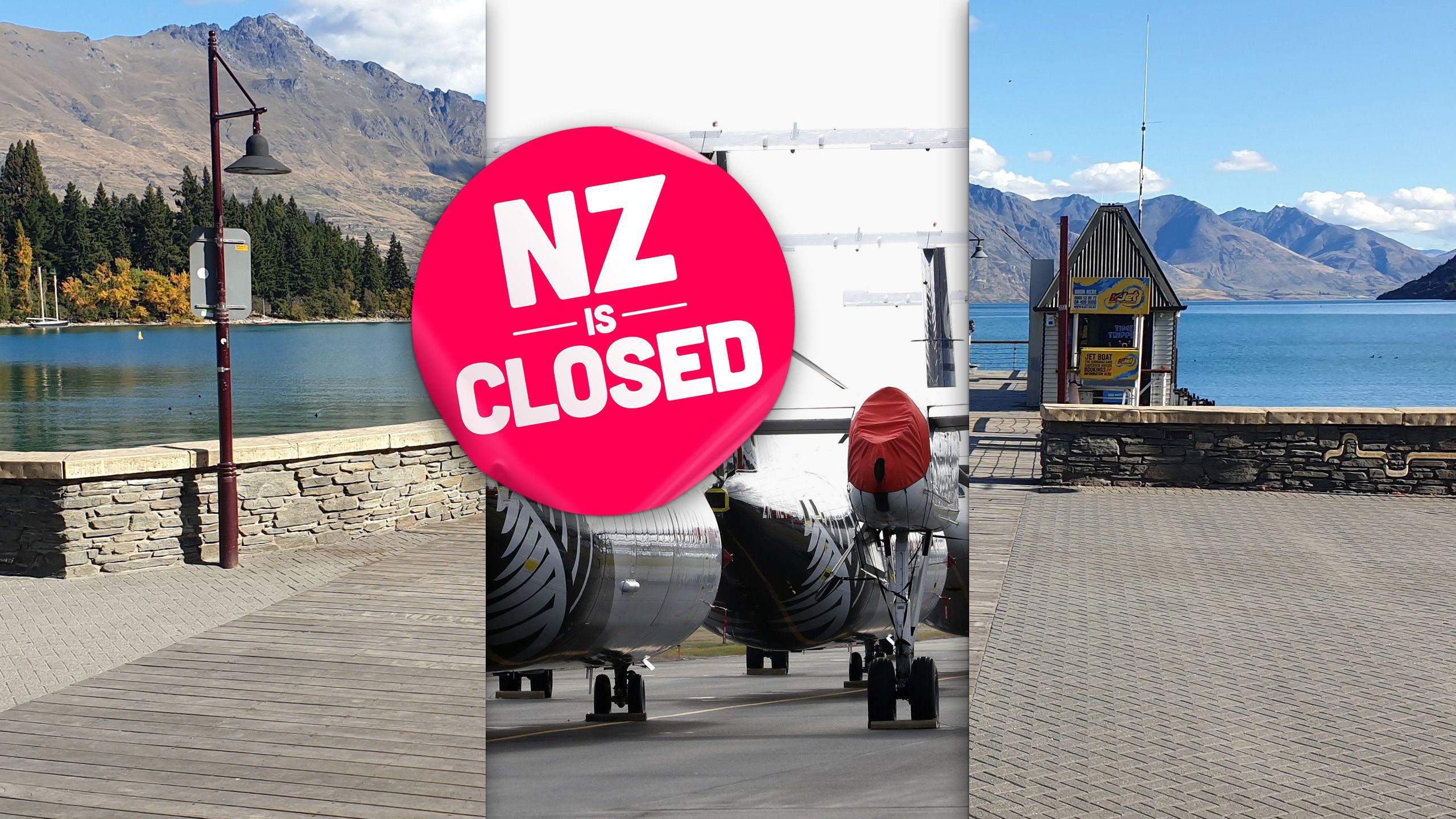









There is one rule that applies at Covid-19 alert levels 1, 2, 3 and 4 in New Zealand: no visitors. It’s the most enduring and impactful measure of our response. What has it done to our country?
Trustworthy, accurate and reliable news stories are more important now than ever. Support our newsrooms by making a contribution.
Contribute Now
Be careful what you wish for.
Before the coronavirus pandemic struck, many New Zealanders complained we had too many tourists.
Now they know what it is like to have too few.
Since late April, there have been four days when nobody flew into New Zealand.
It’s hard to say when that last happened, but it was probably in the 1940s when World War II restricted travel.
The global coronavirus pandemic has closed our borders to all but New Zealand citizens and residents, and a few select foreigners granted exemptions.
Just six international airlines are now flying passengers into the country, compared with 29 pre-Covid, and flight numbers have plummeted from 800 per week to 42.
The Capa Centre for Aviation predicts domestic flights will be back to 80 per cent of pre-Covid levels by the end of the year, but international flights will remain down by close to 90 per cent.
Instead of accommodating holiday makers and business travellers, hotels are housing thousands of returning Kiwis forced to spend 14 days in quarantine and managed isolation.

Fences around the Commodore Hotel, near Christchurch Airport, which has been used as an isolation facility. (PHOTO: JOSEPH JOHNSON)
Fences around the Commodore Hotel, near Christchurch Airport, which has been used as an isolation facility. (PHOTO: JOSEPH JOHNSON)
Six months ago, such drastic measures would have been unthinkable for a country that welcomed almost 4 million international visitors annually, and where the $41 billion tourism spend accounted for 20 per cent of export earnings.
Now, no one questions whether or not it’s a good idea. The only squabbling is over how tightly shut the border should be.
But this is a big deal. As we continue life physically isolated from the rest of the world, many New Zealanders have had their lives turned upside down.
WHOSE ROUND?
/**span.subhead-bg**/DARCY PEACOCK, PUB TOUR HOST/*/*

High-volume, high-profile attractions such as Hobbiton, Shotover Jet, Waitomo Caves and AJ Hackett Bungy were devastated by the border closure.
But most of our more than 20,000 tourism ventures are small, run by owner operators like Aucklander Darcy Peacock who has been piecing his job back together after coronavirus pretty much wiped out all his usual sources of income.
He had to stop his Auckland Historic Bar Tour, the dance events he ran in a Grey Lynn hall, and guiding free Auckland city walks.
(VIDEO: RYAN ANDERSON)
(VIDEO: RYAN ANDERSON)
A job teaching English as a second language fizzled out when most of his overseas students headed home.
The $85 a head bar tour visited well-known CBD watering holes, with Peacock delivering a potted social history of Auckland via anecdotes about explorer Captain James Cook’s attempt at brewing New Zealand’s first beer, the temperance movement, and the 6’clock swill.
However, switching from 30-something overseas Airbnb tourists to hosting Kiwis on their home turf has been a bumpy ride.

Peacock pointing out the sites on an Auckland walking tour. (PHOTO: RYAN ANDERSON)
Peacock pointing out the sites on an Auckland walking tour. (PHOTO: RYAN ANDERSON)
Before this week’s return to level 3, his two bookings since the end of the first lockdown had included five local guys celebrating a 50th birthday. Quiet central city bars had been very pleased to see them.
The elusive trans-Tasman bubble - now even further away than it seemed a month ago - would undoubtedly help. “There’s a glimmer of hope and then it’s snatched away again.”
But Peacock is not giving up yet. “I’ve put so much time and effort into it … I just can’t let it go.”
DESTINATION TO ISOLATION:
/**span.subhead-bg**/SUDIMA HOTELS’ LES MORGAN/*/*

The fast-changing nature of the Covid-19 pandemic, and the unknown length of the border closure makes planning a nightmare.
The much anticipated trans-Tasman bubble suddenly burst because of a sudden spike of cases in Australia putting Victoria back into lockdown.
The Apec leaders forum, due to bring up to 20,000 people here next year, has turned into a “virtual” meeting instead.
Colliers real estate hotel specialist Dean Humphries says about 25 hotels with 3800 rooms are under construction, but plans for at least two more have been delayed.

The Hotel Salisbury on the corner of Salisbury and Madras Streets in Christchurch delayed its opening. (PHOTO: CHRIS SKELTON)
The Hotel Salisbury on the corner of Salisbury and Madras Streets in Christchurch delayed its opening. (PHOTO: CHRIS SKELTON)
In Christchurch, a new boutique hotel due to open in March initially kept the doors closed on its chandeliered foyer, and advertised the opening of a dairy in vacant space on the premises. It has since opened.
Auckland has 900 new rooms coming on stream over the next six months. In 2021, the Rugby World Cup and the America’s Cup will help fill beds. The ICC Women’s Cricket World Cup has been postponed to 2022.
If any of those events are cancelled by the pandemic “it won’t be good”, Humphries says.
Contracts for “iso work” have filled more than 6000 hotel rooms, but it helps a fraction of the 250 hotels nationwide where winter occupancy rates are very low.
It’s not pretty, we’re talking occupancy rates of 20 to 50 per cent, but a lot of places in the world are under 20 per cent occupancy.
In the three months to June, there were 84,500 full time workers in accommodation and food services, down 9500 on the same period last year.
Isolation contracts have allowed Sudima Hotels chief operating officer Les Morgan to rehire half of the 450 workers he had let go.
Acutely aware of what was happening in China, he ordered personal protective equipment (PPE) back in February, but the border closure was still a shock.

Staff on reception at Auckland's Sudima hotel. (PHOTO: RICKY WILSON)
Staff on reception at Auckland's Sudima hotel. (PHOTO: RICKY WILSON)
Morgan says the Sudima Rotorua now looks like a cross between a hospital and a military camp, sparking a backlash from those worried about hosting arrivals from countries where coronavirus is rampant.
“We’re still having examples of our hotel staff refused service in stores.”
Not a single employee has been infected on the job, and despite strict hygiene standards, Morgan says some guests have indicated they would be reluctant to stay in former quarantine facilities.
“There’s no risk, but just because we know that, we can’t assume other people will buy into that.”
Realistically, he says the border closure could continue for a couple of years.
If things in America and Australia continue to deteriorate, I can't see a situation where the New Zealand public would tolerate an opening of the border.
Meantime, some aspects of the hotel industry may change for good.
New technology will allow contactless check-ins online or via mobile phones.
Wasteful labour-intensive breakfast buffets have gone, prompted in part by guests’ aversion to shared serving utensils.
Some of the “nice to haves” – mini bars and chocolates on the pillow – will disappear as hotels cut costs to the bone.
FOLDED AND SHELVED:
/**span.subhead-bg**/PACIFIC LINEN MANAGING DIRECTOR GAYLENE ASHBY/*/*

Hotels operating as isolation facilities are forced to close meeting spaces for conferences and seminars, and are unable to accommodate out-of-town delegates.
This is causing major problems for conference organisers juggling rescheduled business events.
Conventions and Incentives New Zealand chief executive Lisa Hopkins estimates around 20 conferences, each attracting between 500 and 1500 attendees, have been postponed until next year or 2022.

Construction of Christchurch’s Te Pae convention centre has been delayed. (PHOTO: TE PAE)
Construction of Christchurch’s Te Pae convention centre has been delayed. (PHOTO: TE PAE)
Conferences and business events generated $477m last year, bringing in almost 80,000 overseas delegates (more than half of them Australians) who spent $168m.
Some conferences are “going virtual”, with keynote speakers and delegates taking part via video links.
That requires investment in the right technology, and coaching participants on how to use it. Face-to-face meetings are still preferable, Hopkins says.
In lieu of exotic overseas destinations now out of reach, incentive programmes to reward high-performing employees are concentrating on local experiences, so a luxury weekend in Waiheke could replace a trip to Cambodia.
Hopkins says business events are picking up slowly. “But there is no doubt that our international attendees, especially the Australians, are leaving a hole which no amount of domestic business can fill.”
A swathe of small enterprises, from florists to theming companies, don’t get paid until an event is held, so cancellations and delays hit hard.
The Pacific Linen warehouse shelves in Auckland are packed with table cloths, napkins, chair covers, sheets and towels normally in use at hotels, conferences and weddings.

Pacific Linen's warehouse is much fuller than usual. (PHOTO: JASON DORDAY)
Pacific Linen's warehouse is much fuller than usual. (PHOTO: JASON DORDAY)
Managing director Gaylene Ashby says linen hire in parts of the South Island was down by 70 per cent. Her staff had spent months preparing for the June Flight Centre Ball for 1500 people, which did not go ahead.
The border closure has affected wedding bookings because couples are waiting until they are sure international guests can attend.
Ashby says a large Covid-19 cluster connected to Bluff wedding was also damaging. “That’s not good for our sector. People are scared.”
CUT LUNCHES:
/**span.subhead-bg**/GERALDINE BERRY BARN BAKERY AND CAFE OWNER HILARY CRAIGIE/*/*

Although Kiwis are supporting local cafes, bars and restaurants, here too the lack of tourists has not been cancelled out.
Restaurant Association chief executive Marisa Bidois says spending on hospitality was still down $52m a week in June compared with last year and the association had so far dealt with 30 business closures.
“Tourists will be out for lunch, dinner and often breakfast as well,” Bidois says.
“I was speaking to a member and 60 per cent of his turnover was from overseas credit cards prior to lockdown.”
Ministry of Business, Innovation and Employment figures reflect that.
Pre-Covid, international visitors spent twice as much on restaurants, cafes, takeaways and accommodation as domestic visitors, who spent more on fuel, transport and supermarket shopping.
A tour bus drought has left Geraldine Berry Barn bakery and cafe owner Hilary Craigie with a financial headache and a dearth of customers to admire her bright new Kiwiana mural.

The Kiwiana mural at Geraldine's Berry Barn Bakery and Cafe was created by artist Graham Hennessy. (PHOTO: MYTCHALL BRANSGROVE)
The Kiwiana mural at Geraldine's Berry Barn Bakery and Cafe was created by artist Graham Hennessy. (PHOTO: MYTCHALL BRANSGROVE)
Geraldine was a prime “tea and pee” stop for tour buses en route to Lake Tekapo and Aoraki/Mt Cook.
Craigie catered for up to 10 bus loads a day until lockdown began in March, and although winter was always quieter, there was enough passing trade to keep things ticking over in the 100 seat cafe.
Not this year.
Right now our lunch rush is on and we have got maybe six people in the shop. We used to have queues leading out the door.
Instead of a dozen different varieties of sandwiches, there are just four.
Pie production is down because Craigie says they were throwing too many away, and the eight staff are running out of things to clean.
“We might have to shut down until summer.
“The only day we ever shut was Christmas Day before this Covid.”
GREEN WASTE:
/**span.subhead-bg**/HYDROPONIC LETTUCE GROWERS ERIKA AND ANDREW LOVELL-COLBY/*/*

In Queenstown, Erika Lovell-Colby and husband Andrew grow hydroponic lettuces in 2000 square metres of glasshouses at the aptly named Crystal Gardens.
In summer, about 700kg of lettuce a week goes to hotels, cruise boats, barbecues at Walter Peak station, and into Ferg Burger burgers.
April is normally a great month for growing, but this year during the five-week lockdown, Lovell-Colby says 25,000 lettuce plants ended up on the compost heap.

“It was heartbreaking, we gave them away, but people can only take so much.”
Having once lost a glasshouse in a freak snow storm, she knows all about starting over.
“You realise you won’t curl up and die and there’s a way through it.”
The wage subsidy allowed them to retain seven part-time workers, and the Queenstown revival post-lockdown is providing its own challenges.
“NZ inc has really heeded the call, the town is cranking and we are sadly undercooked in what we planted – bummer all round.”
DOCKED:
/**span.subhead-bg**/IAN HOLROYD OF SHORE TRIPS AND TOURS/*/*

Cruise ship visits have been suspended indefinitely, but cruise lines are lobbying hard for their reinstatement.
The industry had a horror start to the summer with Ovation of the Seas passengers caught up in the Whakaari/White Island volcanic eruption that left 21 dead.
Then cruise ships riddled with coronavirus hit the headlines.

The Ruby Princess, docked at Picton. (PHOTO: SCOTT HAMMOND)
The Ruby Princess, docked at Picton. (PHOTO: SCOTT HAMMOND)
The Ruby Princess’ visit to New Zealand sparked a cluster of 24 cases and it was eventually associated with more than 650 cases and 21 deaths.
According to Stats NZ, spending associated with cruise ships – bunkering, berthing, pilotage fees, provisions, shore excursions and GST – reached $570m for the year ended June 2019.
Vessels carrying 322,000 passengers, almost half of them Australians, made close to 1000 port calls from the Bay of Islands in the north to Stewart Island in the south, so port companies, ships provedors and agents face big losses while the cruise ban continues.
Christchurch’s new $56m cruise berth was due to open in October, bringing large vessels back to the Port of Lyttelton for the first time since the 2011 earthquakes.

Cruise ship passengers at Akaroa.
Cruise ship passengers at Akaroa.
Ian Holroyd heads Tauranga-based Shore Trips and Tours, which sells excursions from 45 ports around Australia and New Zealand.
He had to refund close to $450,000 for the last 15 ships due to visit New Zealand in March and April, and says that represents a significant loss of income for some of the almost 200 businesses that ran passenger tours.
Holroyd says the mothballing of the Dunedin Railway tours, with the loss of 51 jobs, was devastating.

Dunedin's iconic railway station. (PHOTO: 123RF)
Dunedin's iconic railway station. (PHOTO: 123RF)
“It’s like ripping the heart out of Dunedin, it’s one of the main draw cards to get people off the ship and into the city.”
City council-owned Dunedin City Holdings is a major shareholder, and chair Keith Cooper says losing cruise income came on top of a pre-Covid loss of $800,000.
“When 80 per cent of your [80,000] customers evaporate overnight, it crystallises your problem pretty quickly.”
Some cruise lines are already advertising sailings from New Zealand ports later this year, and Holroyd is convinced voyages will be safe once strict hygiene protocols and rapid, rigorous pre-cruise tests are in place.

David Simmons in the Christchurch Botanic Gardens, one of the city’s most visited tourist attractions. (PHOTO: JOSEPH JOHNSON)
David Simmons in the Christchurch Botanic Gardens, one of the city’s most visited tourist attractions. (PHOTO: JOSEPH JOHNSON)
Lincoln University emeritus professor of tourism David Simmons is not sure that will wash with consumers. He says the personal risks associated with coronavirus could make it very challenging to reignite passenger confidence and demand.
A Cruise Association recovery plan wants to kick things off with small luxury vessels taking Kiwis-only voyages around New Zealand, adding international passengers from October 2022.
But the document acknowledges ships may not be welcomed in some ports, and it outlines a PR campaign to highlight the economic importance of the industry, and emphasise that cruise ships were not to blame for Covid-19.
RINSE, REPEAT:
/**span.subhead-bg**/FACING THE FUTURE/*/*

Even with the borders closed for the foreseeable future, and the return to a lockdown of sorts this week, Tourism New Zealand (TNZ) is trying to keep the NZ brand alive in the wider world, ready for when we reopen for business.
We will remain on people's bucket list, the challenge is we can't get on their ‘to do’ list for a while.
"You have to balance that story very carefully because we don't want to oversell or over promise something you can’t have.”
When it comes to reopening the borders, Simmons errs on the side of caution.
Simmons believes borders might not reopen fully until 2022, and it could be a decade before tourism gets back to where it was pre-Covid-19.
What’s more, he says, we must be prepared for the possibility of this happening again.
“If we had a virus with a much shorter incubation period – say four days – most people are out of Auckland and in Queenstown or Rotorua.
“If you look at the trend of pandemics across time, they are increasing, and they absolutely are hitch-hikers on our trade and transport systems.”
Become a Stuff supporter today for as little as $1 to help our local news teams bring you reliable, independent news you can trust.
Contribute Now
Words: Amanda Cropp
Data graphics: Felippe Rodrigues
Design & layout: Aaron Wood
Editor: John Hartevelt
Essential coronavirus information
Full coverage

Get the daily newsletter

Latest NZ case numbers

Keeping NZ in business

Neighbourly: community support

Official Government Covid-19 page



